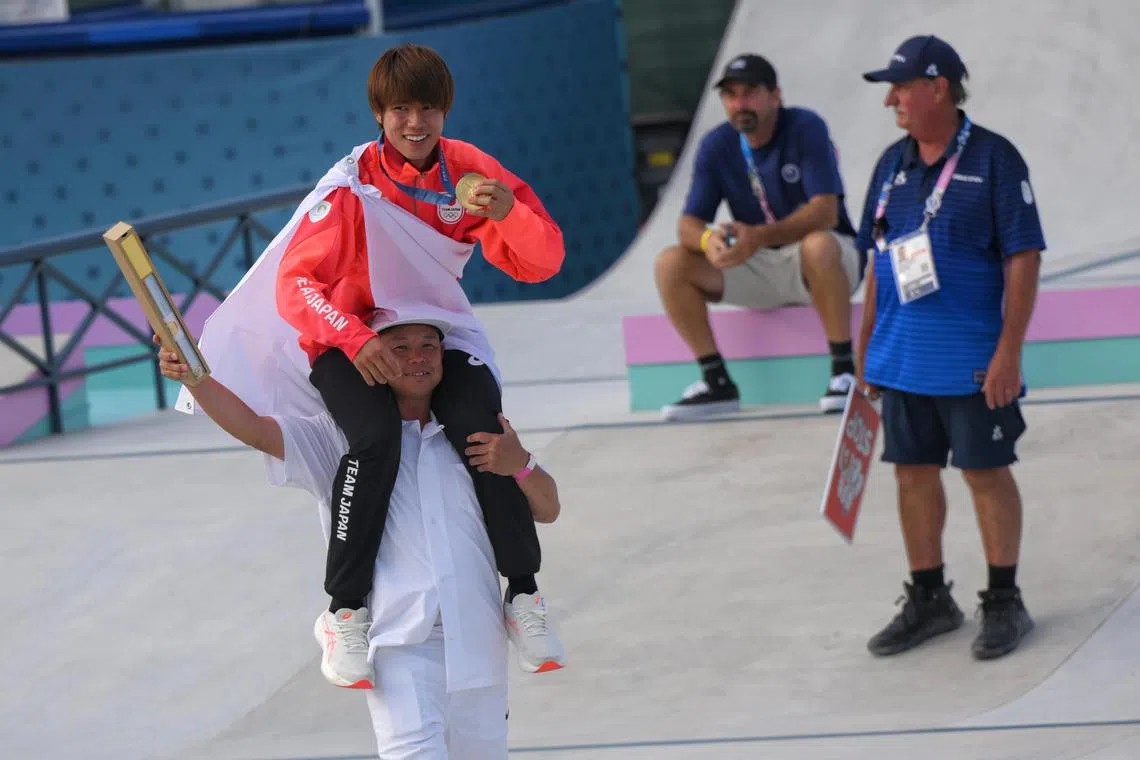Yuto Horigome’s Olympic success sparks skateboarding boom in Japan
Sign up now: Get the biggest sports news in your inbox

Yuto Horigome on the shoulders of his coach after winning the men’s skateboarding street final.
ST PHOTO: MARK CHEONG
Follow topic:
PARIS – After pulling off a nollie 270 noseblunt slide for the gold, two-time Olympic men’s street skateboarding champion Yuto Horigome was asked why Japan is so good at the sport, drawing laughter from the medallists at the press conference.
“Great, great question,” said the tickled American bronze medallist and six-time world champion Nyjah Huston, while silver medallist Jagger Eaton good-naturedly quipped: “Yeah, we would like to know.”
It was an answer that everyone wanted too, as Japan now have five out of six golds since skateboarding was introduced at the Tokyo Games in 2021.
Horigome replied: “Everyone’s level has risen since the Tokyo Olympics. I’m always practising to the limit, even in the midst of a no-hoper situation.”
He offered another reason in an earlier interview with American skateboarding magazine Thrasher: “Maybe we have better focus... Japan doesn’t have good skateparks. I moved to Los Angeles and my skating definitely got better, skating with all the pros.”
On July 29, the 25-year-old displayed that focus and never-say-die attitude to retain his title at La Concorde, a segment of which has been transformed into an urban playground with 18 stairs, ledges, curbs and handrails as athletes zip around in the summer heat to the tunes of Snoop Dogg – who was in attendance – and Dr Dre.
Skateboarders are judged on how well they control their board while performing manoeuvres during two 45-second runs and five tricks which can each score a maximum of 100 points. The total score consists of one’s best run and two best tricks.
In what was rated the most gnarly – skateboard speak for amazing – finals ever, Horigome was initially fourth after scoring 89.90 in the run component, and then seventh going into the final trick after scratching his second, third and fourth attempts.
However, a stunning nollie 270 backside noseblunt at the death gave him 97.08 points and a 281.14 total
Horigome’s win, as well as 14-year-old Coco Yoshizawa’s gold in the women’s street event, will give the sport another boost in his home country after the success of Tokyo 2020.
While Japan has had a relatively rich skateboarding culture since the 1970s, Japanese news website Nippon.com noted that “public sentiment towards the sport was quite negative” before the Tokyo Olympics, as skateboarders were seen as delinquents and nuisances who could cause injury to passers-by or damage property as they practised in public spaces.
But Japan winning three out of the four park and street golds through Horigome and two teenage girls at the Tokyo Games helped improve its image.
Trail-blazer Horigome has also been an inspiration to other skateboarders.
Japan coach Daisuke Hayakawa shared how his protege started skateboarding at seven and moved to Los Angeles at 16 to further his ambitions.
The 50-year-old, whose shoulders Horigome sits on after every win, told Olympics.com: “Up until then, Japanese professional skaters never ventured outside the country and were content with just being pros in Japan. Then comes someone like Yuto, who is from a new generation with big dreams.
“The world was coming to their doorstep so why not let them go to America. Now you have kids who were following Yuto’s movements wanting to be not No. 1 in Japan, but No. 1 in the world – and that has been the most crucial change in Japanese skateboarding.
“In parallel with all this, skateboarding becomes a part of the Olympics. What follows is a conversion – the kids who were eyeing the world are now eyeing the Olympics, and the timing couldn’t have been better. The growth of Japanese skateboarding and the Olympics crossed paths at just the right time.”
Government support has also increased. According to the Japan Skate Park Association, the number of public skateboarding venues increased from 100 in 2017 to 434 in 2023.
Hayakawa noted the change in perception as parents have gone from telling their kids not to skateboard to taking them out to skateparks and buying equipment.
All these have helped turn Japan into a skateboarding powerhouse, so much so that Horigome is not confident of a three-peat in Los Angeles in 2028.
He said: “To even make it to the Japan national team is very difficult. I can’t even think about the next Olympics because there are so many incredible kids around, and physically and mentally I don’t know if I can compete or keep up with them.”

